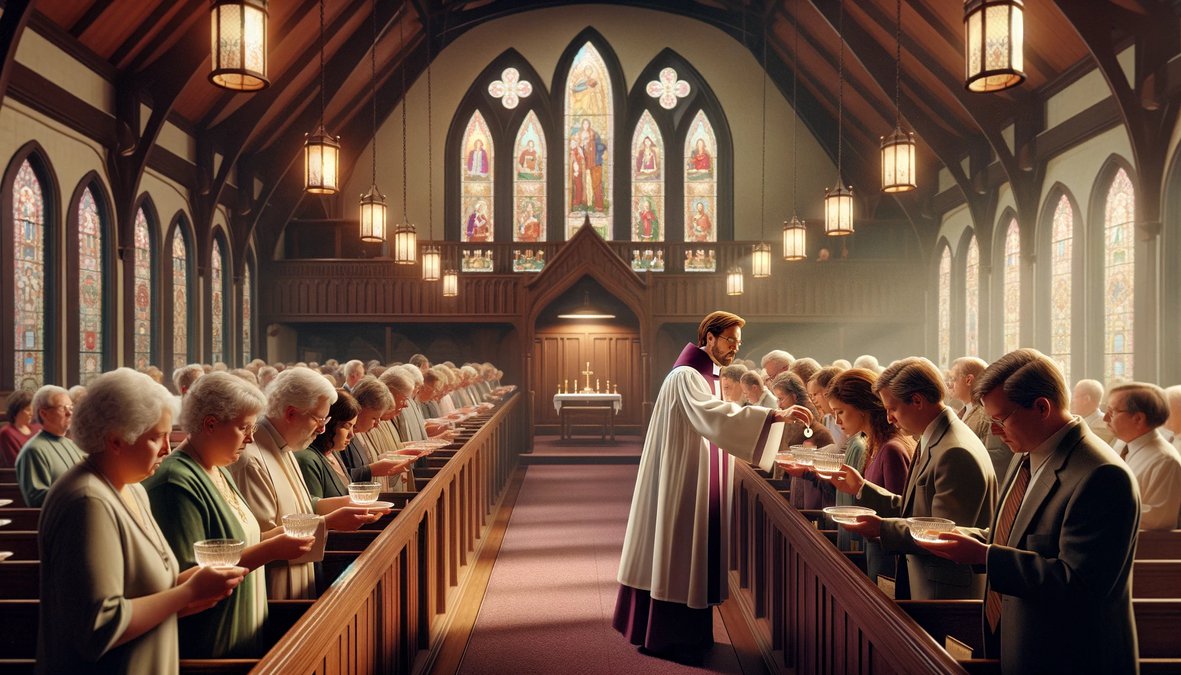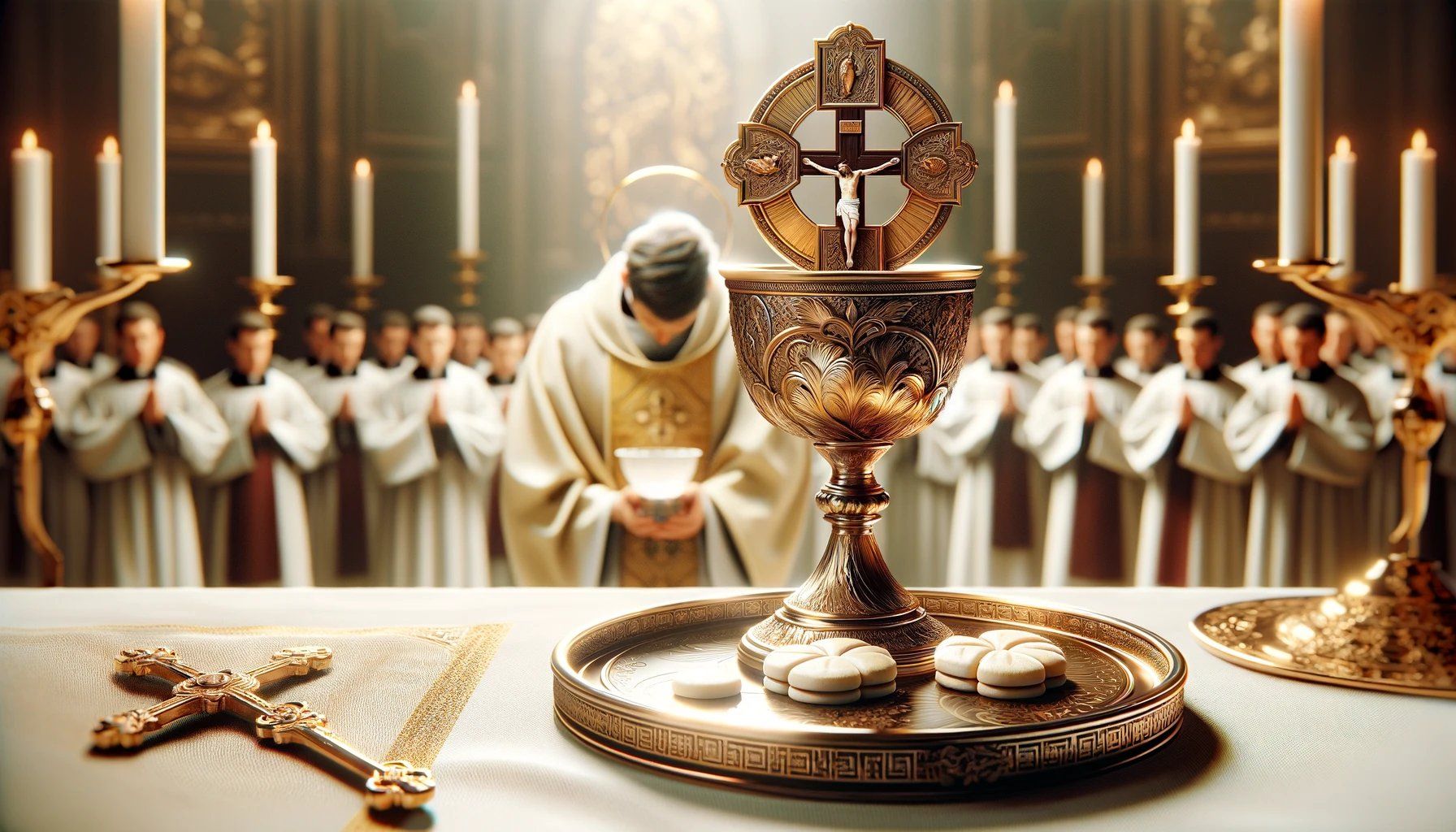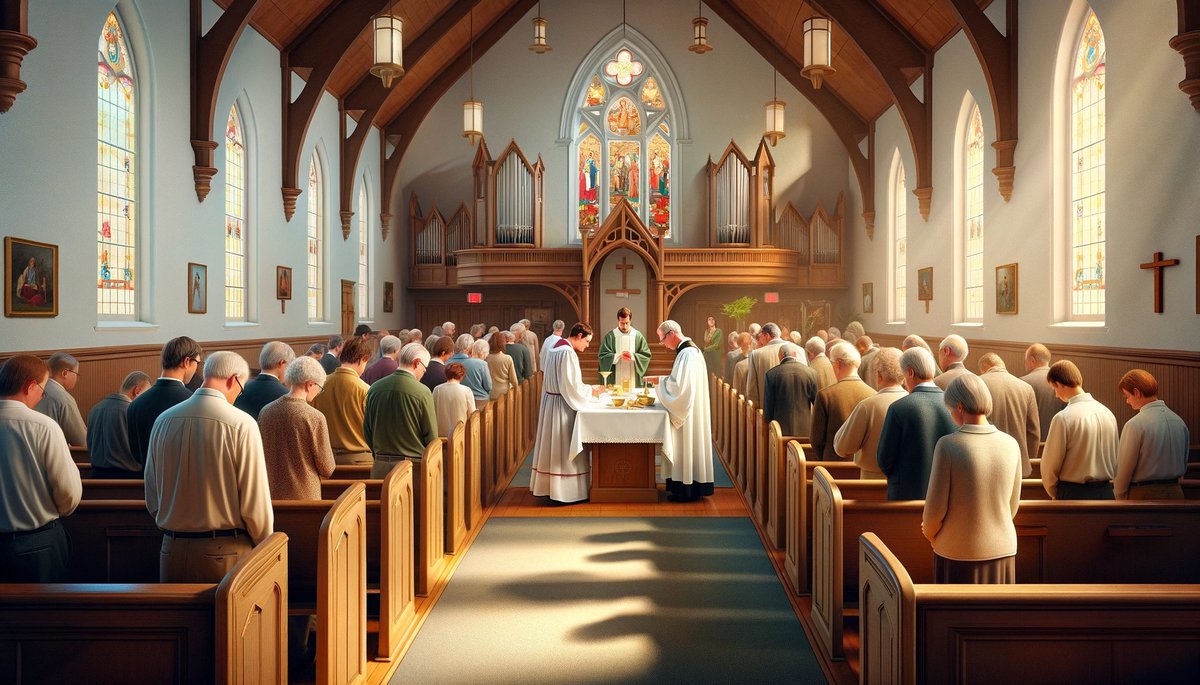Home>Theology and Spirituality>How To Take Communion In The Methodist Church


Theology and Spirituality
How To Take Communion In The Methodist Church
Published: February 24, 2024
Ericka Andersen, an editor at Christian.net, expertly merges digital strategy with content creation, focusing on faith and societal issues. Her communication skills enhance the platform's engaging narratives, fostering meaningful dialogue on belief's impact on society.
Learn about the Methodist Church's practice of taking communion and its significance in theology and spirituality. Discover the rituals and beliefs surrounding this sacred tradition.
(Many of the links in this article redirect to a specific reviewed product. Your purchase of these products through affiliate links helps to generate commission for Christian.net, at no extra cost. Learn more)
Table of Contents
Introduction
Communion, also known as the Eucharist or the Lord's Supper, holds profound significance in the Methodist Church. It is a sacred ritual that symbolizes the spiritual nourishment and unity of believers with Christ and one another. The act of partaking in communion is deeply rooted in the teachings of Jesus Christ and is a central aspect of Methodist worship services.
In this comprehensive guide, we will explore the rich traditions and practices surrounding communion in the Methodist Church. From understanding the theological significance to the practical aspects of preparing for and participating in the communion service, this article aims to provide a holistic view of this sacred sacrament.
Communion is a time-honored tradition that serves as a powerful reminder of Christ's sacrifice and the redemptive grace extended to all believers. It is a sacred moment of reflection, gratitude, and spiritual renewal, inviting participants to partake in the body and blood of Christ symbolically.
As we delve into the intricacies of communion in the Methodist Church, it is essential to approach this topic with reverence and an open heart. Whether you are a lifelong Methodist or someone seeking to understand this sacred practice, this guide will offer valuable insights into the profound spiritual significance of communion and the meaningful ways in which it is observed within the Methodist tradition.
Understanding the Significance of Communion in the Methodist Church
Communion, within the Methodist Church, holds profound significance as a sacrament that symbolizes the spiritual nourishment and unity of believers with Christ and one another. Rooted in the teachings of Jesus Christ, communion serves as a poignant reminder of the Last Supper, where Jesus shared bread and wine with his disciples, instructing them to partake in remembrance of him. This act of sharing in the body and blood of Christ symbolizes the spiritual sustenance and the covenant of grace extended to all who partake in faith.
In the Methodist tradition, communion is viewed as a means of grace, signifying the presence of Christ among the congregation. It is a sacred moment of encounter with the living Christ, where believers are invited to experience spiritual renewal and a deepening of their faith. Through the act of partaking in the bread and the cup, Methodist believers express their unity with Christ and with one another, transcending individual identity to become part of the larger body of Christ.
The Methodist Church upholds the belief in the real presence of Christ in the elements of bread and wine, emphasizing the spiritual reality of Christ's presence during the communion service. This understanding underscores the profound nature of communion as a transformative encounter with the divine, where believers are spiritually nourished and empowered to live out their faith in the world.
Furthermore, communion in the Methodist Church embodies the principles of reconciliation and inclusivity. It serves as a tangible expression of God's inclusive love, welcoming all who seek to partake in faith, regardless of their background or circumstances. This emphasis on inclusivity reflects the Methodist commitment to embracing diversity and extending hospitality to all, mirroring the radical hospitality exemplified by Jesus Christ during his earthly ministry.
In essence, communion in the Methodist Church is not merely a symbolic ritual but a sacred encounter with the living Christ, embodying the core principles of grace, unity, and inclusivity. It stands as a testament to the enduring significance of Christ's redemptive sacrifice and the transformative power of spiritual communion within the faith community. As Methodist believers gather around the communion table, they are reminded of their interconnectedness with Christ and with one another, fostering a deep sense of spiritual communion and solidarity within the body of believers.
Preparing for Communion
Preparing for communion in the Methodist Church involves a thoughtful and reverent approach that encompasses both spiritual and practical aspects. As believers anticipate partaking in this sacred sacrament, there are meaningful steps to consider in readiness for the communion service.
Spiritual Preparation
Spiritual preparation for communion begins with introspection and self-examination. Methodists are encouraged to engage in a period of reflection and prayer, seeking spiritual renewal and reconciliation with God and others. This introspective process allows individuals to examine their hearts, confess any shortcomings, and seek forgiveness, thus approaching the communion table with a spirit of humility and contrition.
Furthermore, spiritual preparation involves cultivating a sense of gratitude and reverence for the redemptive sacrifice of Christ. Methodists are encouraged to meditate on the profound love and grace extended through Christ's sacrifice, fostering a deep appreciation for the significance of communion as a tangible expression of God's enduring love and mercy.
Practical Preparation
Practical preparation for communion encompasses various logistical considerations to ensure the smooth facilitation of the communion service. This may involve the coordination of elements such as bread and wine or grape juice, as well as the arrangement of the communion table and vessels. Additionally, ensuring that the communion service is integrated seamlessly into the overall worship service schedule is essential for a cohesive and meaningful worship experience.
Moreover, clergy and church leaders play a pivotal role in guiding the congregation through the preparation process, offering pastoral support and spiritual guidance as believers ready themselves to partake in communion. Their leadership in facilitating a reverent and inclusive atmosphere contributes to the overall spiritual readiness of the congregation.
Read more: How Often Do Methodists Have Communion
Communal Preparation
Communal preparation for communion emphasizes the collective nature of the sacrament, highlighting the unity and interconnectedness of believers within the faith community. Methodists are encouraged to engage in acts of reconciliation and peacemaking, fostering harmonious relationships and a spirit of unity within the faith community. This communal preparation underscores the significance of approaching the communion table with a sense of shared fellowship and mutual respect, recognizing that all believers are partakers in the body of Christ.
In essence, preparing for communion in the Methodist Church involves a holistic approach that integrates spiritual reflection, practical considerations, and communal unity. By embracing this multifaceted preparation process, believers are poised to partake in communion with reverence, gratitude, and a deep sense of spiritual readiness, fostering a meaningful and transformative communion experience within the Methodist tradition.
Participating in the Communion Service
Participating in the communion service within the Methodist Church is a deeply meaningful and sacred experience that invites believers into a profound encounter with the living Christ. As the congregation gathers around the communion table, there are significant aspects to consider when actively engaging in this transformative sacrament.
Reverent Approach
Methodists approach the communion service with a spirit of reverence and humility, recognizing the sacred nature of the ritual. As the elements of bread and wine, or grape juice, are presented, believers are called to embrace a posture of solemnity and awe, acknowledging the spiritual significance of partaking in the body and blood of Christ symbolically. This reverent approach fosters a sense of spiritual receptivity and openness, creating a conducive atmosphere for encountering the presence of Christ in the communion service.
Active Participation
Active participation in the communion service involves engaging both heart and mind in the sacred act of partaking in the elements. Methodists are encouraged to approach the communion table with a spirit of expectancy and faith, anticipating the transformative encounter with the living Christ. As the elements are distributed, believers are invited to partake thoughtfully and intentionally, embracing the spiritual nourishment and grace symbolized by the bread and the cup. This active participation underscores the communal nature of the sacrament, emphasizing the unity and interconnectedness of believers as they partake together in remembrance of Christ.
Read more: How To Take Orthodox Communion
Spiritual Communion
Participating in the communion service extends beyond the physical act of consuming the elements; it encompasses a profound experience of spiritual communion with Christ and fellow believers. Methodists are called to cultivate a deep sense of spiritual awareness and receptivity, allowing the sacred symbolism of the bread and wine to evoke a profound sense of unity and fellowship within the faith community. This spiritual communion transcends individual identity, drawing believers into a collective expression of faith and solidarity as they partake in the body and blood of Christ symbolically.
Reflective Engagement
During the communion service, believers are encouraged to engage in reflective contemplation, meditating on the redemptive sacrifice of Christ and the enduring significance of his presence in the sacrament. This reflective engagement fosters a deep sense of gratitude and reverence, allowing individuals to internalize the profound love and grace extended through Christ's sacrifice. By actively participating in this reflective contemplation, Methodists embrace the transformative power of communion, experiencing spiritual renewal and a deepening of their faith as they commune with the living Christ.
In essence, participating in the communion service within the Methodist Church is a multifaceted experience that encompasses reverence, active engagement, spiritual communion, and reflective contemplation. As believers gather around the communion table, they are invited into a sacred encounter with the living Christ, fostering a deep sense of spiritual communion, unity, and transformative grace within the faith community.
Receiving the Elements
Receiving the elements of bread and wine, or grape juice, during the communion service is a deeply significant and symbolic act within the Methodist Church. As believers approach the communion table to partake in these sacred elements, there are profound aspects to consider in the reception of the elements.
Approach of Reverence
The act of receiving the elements begins with a posture of reverence and humility. Methodists are encouraged to approach the communion table with a sense of solemnity and awe, recognizing the sacred nature of the ritual. As the elements are presented, believers are called to embrace a spirit of reverence, acknowledging the profound symbolism of partaking in the body and blood of Christ symbolically. This reverent approach sets the tone for a meaningful and transformative reception of the elements, creating a space for encountering the presence of Christ in a deeply personal and spiritual manner.
Read more: How To Take The Holy Communion
Intentional Reception
Receiving the elements during the communion service involves intentional and mindful participation. Methodists are encouraged to receive the bread and the cup thoughtfully, embracing the spiritual nourishment and grace symbolized by these elements. As the elements are offered, believers are invited to partake with a sense of expectancy and faith, recognizing the profound significance of this act of remembrance. This intentional reception underscores the communal nature of the sacrament, emphasizing the unity and interconnectedness of believers as they partake together in the spiritual sustenance and grace offered through the elements.
Read more: How To Take Orthodox Communion
Spiritual Communion
The reception of the elements extends beyond the physical act of consuming bread and wine; it encompasses a profound experience of spiritual communion with Christ and fellow believers. Methodists are called to cultivate a deep sense of spiritual awareness and receptivity as they receive the elements, allowing the sacred symbolism of the bread and the cup to evoke a profound sense of unity and fellowship within the faith community. This spiritual communion transcends individual identity, drawing believers into a collective expression of faith and solidarity as they partake in the body and blood of Christ symbolically.
Reflective Engagement
Receiving the elements also involves reflective engagement with the redemptive sacrifice of Christ and the enduring significance of his presence in the sacrament. As believers partake in the elements, they are encouraged to engage in reflective contemplation, meditating on the profound love and grace extended through Christ's sacrifice. This reflective engagement fosters a deep sense of gratitude and reverence, allowing individuals to internalize the transformative power of communion, experiencing spiritual renewal and a deepening of their faith as they commune with the living Christ.
In essence, the reception of the elements during the communion service is a sacred and transformative experience that encompasses reverence, intentional reception, spiritual communion, and reflective engagement. As believers partake in the bread and the cup, they are invited into a profound encounter with the living Christ, fostering a deep sense of spiritual communion, unity, and transformative grace within the faith community.
Conclusion
In conclusion, the act of taking communion in the Methodist Church is a deeply profound and spiritually enriching experience that encompasses both the theological significance and the practical aspects of participation. It serves as a powerful symbol of the spiritual nourishment and unity of believers with Christ and one another, rooted in the teachings of Jesus Christ and the enduring traditions of the Methodist Church.
The significance of communion in the Methodist Church extends beyond a mere ritual; it embodies the principles of grace, unity, and inclusivity. As believers gather around the communion table, they are reminded of their interconnectedness with Christ and with one another, fostering a deep sense of spiritual communion and solidarity within the body of believers. The real presence of Christ in the elements of bread and wine underscores the transformative nature of communion as a sacred encounter with the living Christ, where believers are spiritually nourished and empowered to live out their faith in the world.
Furthermore, the preparation for communion involves a holistic approach that integrates spiritual reflection, practical considerations, and communal unity. By embracing this multifaceted preparation process, believers are poised to partake in communion with reverence, gratitude, and a deep sense of spiritual readiness, fostering a meaningful and transformative communion experience within the Methodist tradition.
Participating in the communion service invites believers into a profound encounter with the living Christ, fostering a deep sense of spiritual communion, unity, and transformative grace within the faith community. The reverent approach, active participation, spiritual communion, and reflective engagement during the communion service contribute to a meaningful and transformative experience for believers as they partake in the body and blood of Christ symbolically.
Receiving the elements of bread and wine, or grape juice, during the communion service is a deeply significant and symbolic act within the Methodist Church. The approach of reverence, intentional reception, spiritual communion, and reflective engagement during the reception of the elements creates a space for encountering the presence of Christ in a deeply personal and spiritual manner, fostering a deep sense of spiritual communion, unity, and transformative grace within the faith community.
In essence, the act of taking communion in the Methodist Church is a sacred and transformative experience that invites believers into a profound encounter with the living Christ, fostering a deep sense of spiritual communion, unity, and transformative grace within the faith community. As Methodists partake in communion, they are reminded of the enduring significance of Christ's redemptive sacrifice and the transformative power of spiritual communion within the faith community.












